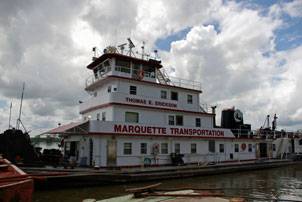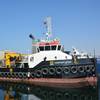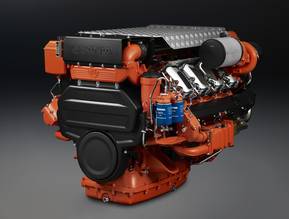A Day in the Life of a Towboater: Part III
Old Salts and New Cooks
By Raina Clark from MarineNews, October 2010
Last August Raina Clark began the story of her eight day trip on the Mississippi and Illinois Rivers on the towboats Theresa Wood and Thomas E. Erickson, both chartered by AEP River Operations and owned and by Marquette Transportation. She described the working lives of the crew, how the relationship between the boats and the lock facilities has changed since 9/11, a river boat captain who built his crew into a tightly knit team and the uniqueness of the Upper Mississippi. In this third and final installment, Raina describes the experience of a first time towboater, the tales of a salty captain and being held up on the river waiting on failing infrastructure.
I left the Theresa Wood and her tow at Lock 10 in Gutenberg, Wis. on the upper Mississippi River. My AEP River Operations contact, Sharon Tharp, who had picked me up at the St. Louis airport and delivered me to the boat five days earlier, was again waiting by the company SUV. By afternoon we had driven to Pekin, Ill. to meet the Thomas E. Erickson, which I would ride down the Illinois River until I was once again on the Mississippi.
Even though Pekin is a small, blue-collar town, the kind of town Bruce Springsteen would sing about, finding the tug company that was to deliver me to the Thomas E. Erickson wasn’t easy. After driving up and down one of the roads running along the banks of the Illinois River, we stopped at a gas station to ask for directions. One man told us he had no idea about any tug company, but we should speak to his friend who knew every person and business Pekin had seen in the last 30 years. His friend in turn told us, “I’ve lived I this town my whole life and I’ve never heard of a tug boat company.”
It wasn’t surprising, considering how unaware the general population is of maritime commerce, even in its own backyard. We finally found the company behind a non-descript chain link fence hung with black and white DHS notices. We’d already passed it twice and I decided Joe Q. Public could be forgiven for not knowing the tug boat company even existed. Ultimately, however, the search was in vain. We were told the tug would not be able to deliver me to the towboat after all. Security reasons.
Plan B was to wait further up river where crew members from the Thomas E. Erickson picked me up in a flat bottomed skiff. Little was said during my first 24 hours on the boat. If I was unsure of what to do with myself, with no specific responsibility other than to observe life on a towboat, the crew was even less sure of what to do with me. I spent the next morning wondering the decks with my camera and seeing few crewmembers until after lunch when I visited the galley.
Sheila Prince, the cook, gave me a smile and asked if I was hungry with a sweet Tennessee drawl. Even though the crew had already eaten and she was surely on her break, she started listing the dishes she’d prepared since that morning: waffles, eggs and sausage, chili cheese dogs, hush puppies and French fries. There was left over lasagna and fried chicken and three kinds of cookies just out of the oven. The smell of fresh cookies won over and I ate while Sheila told me about the crew.
Almost everyone aboard was relief crew, including herself, filling in for the regulars who were taking their time off. They were a very quiet bunch, keeping to themselves, she told me. But the regulars she had met when she first came aboard were just as loud as the crew I’d met on the Theresa Wood, “always laughing and carrying on and teasing each other.”
I understood then why my first day on the Thomas E. Erickson was nothing like my introduction to the Theresa Wood. It was the difference between a regular group of towboaters and a crew in transition; a group of people who knew what to expect from each other and their jobs and one that has yet to chart it all out.
Sheila was brand new herself, just finishing up her first trip on a towboat. Her husband, a preacher in Tennessee, had become very sick with diabetes. They knew she would need to find a way to be self-supporting as his illness progressed, so she applied for a cook position with Marquette Transportation, listing her qualifications as cooking for her family and working at a pre-school. She was terrified at first, she said, especially of the Thomas E. Erickson’s relief captain.
“I was scared to death of John when I first came on,” Sheila said. Captain John Towns looked to her like Yosemite Sam with his great long beard and gruff appearance. Although the boat was a far cry from her pre-school, the job wasn’t much different than cooking for her family. And, she said, “John is really a very nice man.” After a couple days of eating Sheila’s cooking, Towns told her would have requested her as regular cook if he was a regular captain.
Unlike Sheila, Captain Towns has been on the rivers since 1971. He started when minimum wage was 90 cents an hour and came out on the river for $17.50 a day. Up in the pilothouse, on the last day of my trip, he told me he was born and raised in Southern Illinois and was in the Army for four years and the National Guard out of Paducah for another six. He traveled the world with the military and has driven the outer rim of Australia and all through Alaska on bikes (of the Harley Davidson persuasion). In an almost Forest Gump turn of events, in 1969 Towns said he ended up at the most famous hippy event in history while he was on R&R from the Army. He was 17 years old and went to visit a friend who told him there would be lots girls hanging around his farming community.
“When I got there,” Towns said, “no one was around. My friend’s grandmother said everyone went to this field down the way. So we went to find the girls.” And that’s how John Towns went to Woodstock.
After the military, Towns’ first trip on a towboat was 56 days long, “back when they’d let you ride as long as you’d stay on,” he said. “When I got off I said ‘if this is towboatin’ they can go to hell.’” But he was 21 years old and after a couple weeks back home he was broke.
“They called me again and I said, ‘Yeah, I’ll go out one more time.’” Towns smiled, holding up one browned and sun-freckled finger. Here he is today, looking forward to retirement and taking on relief work when he’s not at bike rallies.
The Thomas E. Erickson eventually took me back to the same stretch of the Mississippi where I’d boarded the Theresa Wood, several days earlier. Captain Towns had been told there would be 12 boats waiting to get through the Melvin Price Locks ahead of us and we were in for a 16 hour delay. Each boat would have to break its tow to get through the 600-ft chamber because the 1,200-ft chamber was down.
Twenty-four hours later the Thomas E. Erickson held its position alongside the Issaquena, another Marquette Transportation towboat, at the edge of the river, still waiting to get through the lock. Now we were told the 600-ft lock was also down. Delays at the lock are common place, but before the Melvin Price Locks replaced Lock 26, it was even worse, Towns said. Lock 26 only had one chamber and Towns once waited 35 days to get through.
“All the crew did was sooge and chip and paint,” he said.
It may have been painfully boring for the crew, but preparing to go through Lock 26 turned the pilots’ hair gray. The lock was built at such a place on the river that vessels had to flank (turn and slide sideways with the current) just before lining up to go through.
“It was hell getting through there,” Towns said.
My plan to travel through the locks was eventually scrapped. Sharon drove to where the boat was holding position near a highway paralleling the river. Looking out for Sharon’s car I stood on the deck with Sheila who was also waiting to be picked up. A crew van was due to take her to the company’s office where her husband would meet her and take her the rest of the way home. Sheila wouldn’t be to the office for several more hours, but her husband, who couldn’t wait at home any longer, had already started driving to meet her.
I crossed the tows of the E. Erickson and the Issaquena and was ferried across a stretch of shallow water in a little skiff and finally climbed up a rock embankment to Sharon’s waiting car. The relief mate who pulled the skiff across with a rope told me he’s gotten off boats in many more creative ways. It reminded me of the stories Captain Rusty of the Theresa Wood told me about wearing plastic garbage bags around his legs to hike through muck between a skiff and shore. When it’s your time to go home, he told me, you do what you have to do.
I’d been home for a month when I got a call from Sheila. “You’ll never guess where I am,” she said. I figured she was done with her two weeks off and already in the middle of her second trip. “They put me on the Theresa Wood,” she said. “Captain Rusty asked me to come on regular.”
“That’s really great news!” I told her, happy for both her and the rest of the crew on the Theresa Wood. I could see them enjoying all the twice-baked potatoes, pork chops, steak and eggs, fresh pies and big chocolate cakes they could eat, and Captain Rusty with his tender grilled chicken breast on a bed of fresh greens. A good crew is a second family and I know Sheila and the rest of the crew of the Theresa Wood are looking out for each other.














